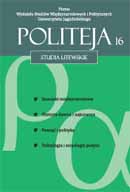Ekonomia polityczna członkostwa Litwy w Unii Europejskiej: oczekiwania i doświadczenia pięciu lat
Political economy of Lithuania membership of the EU: expectations and experience of five years
Author(s): Ramūnas VilpišauskasSubject(s): Politics / Political Sciences
Published by: KSIĘGARNIA AKADEMICKA Sp. z o.o.
Summary/Abstract: The article discusses the impact of European Union membership on the economy, politics and policies of the new member states, in particular Lithuania. It first presents the forecasts and arguments regarding the impact of EU enlargement that were discussed before the enlargement in 2004 -2007. It draws on the work of European inte gration literature, stating that it was the approaching EU enlargement into the Central and Eastern Europe which caused the wave on theorizing the issue of enlargement which has been absent before. The main issue was to explain the reasons behind the EU decision to expand, as well as the conditions for the effective application of EU norms into the acceding countries. Most economic researchers predicted that the enlarge ment will contribute to the economic growth of acceding countries (although the transfer of regulatory norms in some cases could be considered to be suboptimal), and the EU as a whole. There was more uncertainty regarding the impact of the enlargement on the functioning of the EU and the compliance of the new members with the EU norms. The second section evaluates the experience so far, by discussing the studies which have been made on the impact of EU, and concludes that the enlargement has been a positive sum game for the economies of the new member states (as well as for the EU), increasing trade and investments flow and contributing to the catching up with the rest of the EU. Lithuania and other new member states have been among the fastest growing economies in Europe in the last decade. However, it can be argued that the impact of the EU membership is mediated by domestic policies of each member state, and that Lithuania has not attempted to strengthen the positive impulses coming from the EU accession, in particular by postponing the structural reforms in the country. Finally, the article assesses the main European policy priorities in Lithuania, in particular the reasons for some failures (such as the failure to join the eurozone in 2007) and achievements (accession into the Schengen zone, acknowledgement of the importance of integrating the Baltic states into the energy market of the EU). It can be argued that most European policy failures have been caused by the inconsistency and low credibil ity of some domestic policies. The article concludes by providing venues for future research of European policy after the enlargement, in particular the areas of the impact of enlargement on the functioning of the EU, the participation of the new member states in the policy process of the EU, as well as the ability to upload their domestic preferences on the EU agenda.
Journal: Politeja - Pismo Wydziału Studiów Międzynarodowych i Politycznych Uniwersytetu Jagiellońskiego
- Issue Year: 8/2011
- Issue No: 16
- Page Range: 53-77
- Page Count: 25
- Language: Polish

